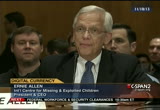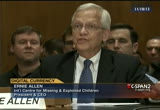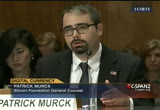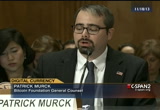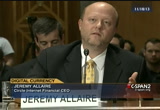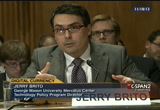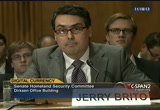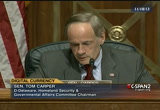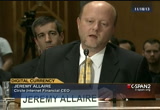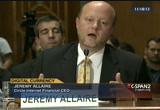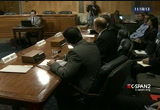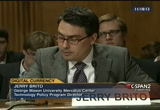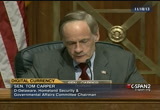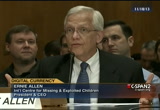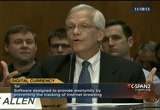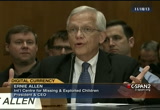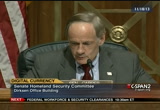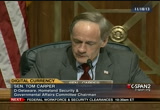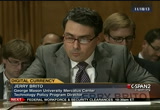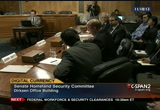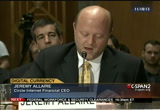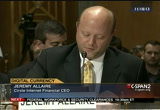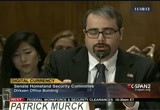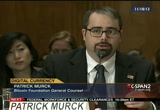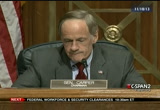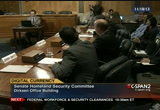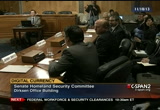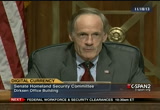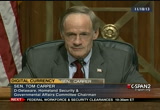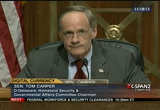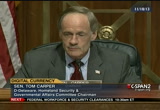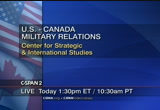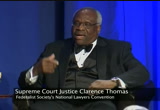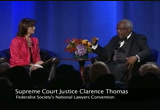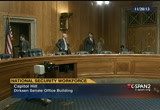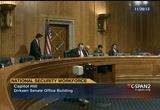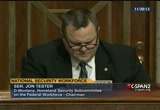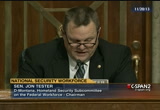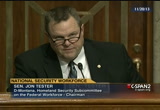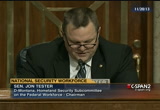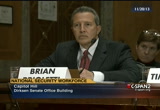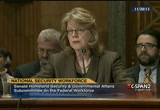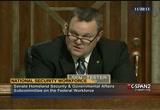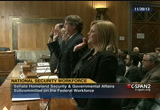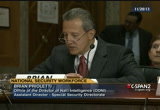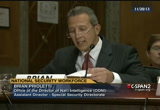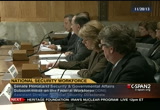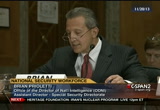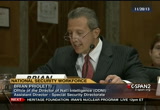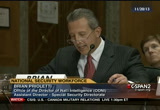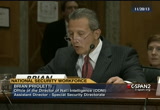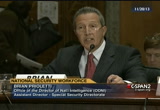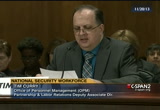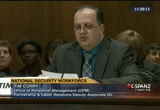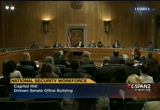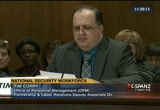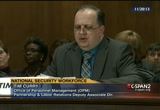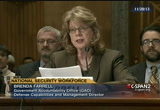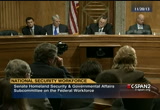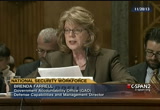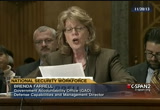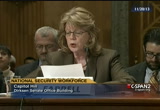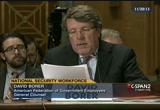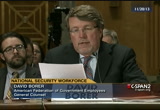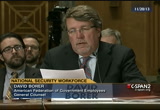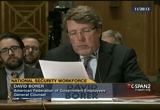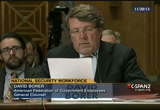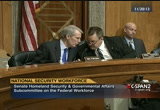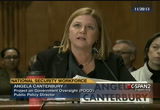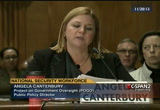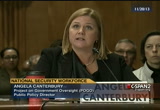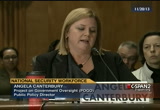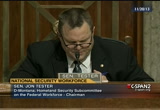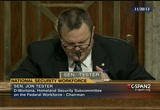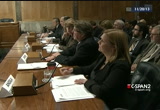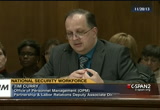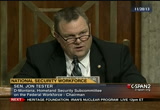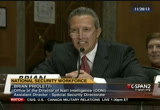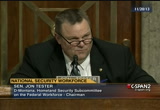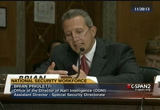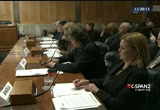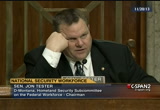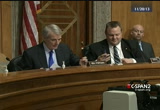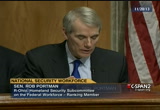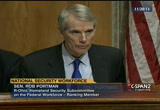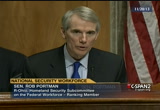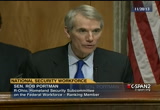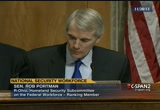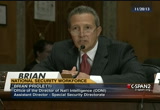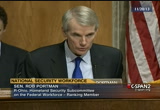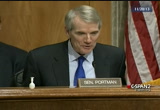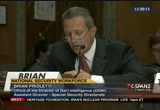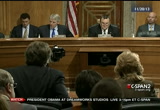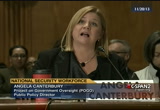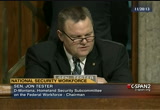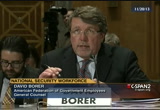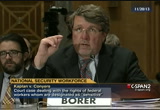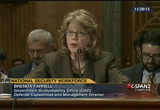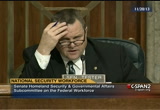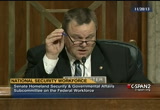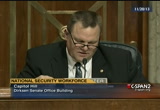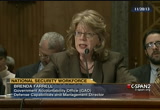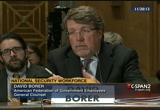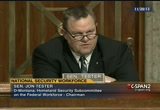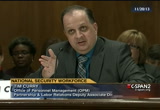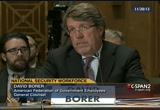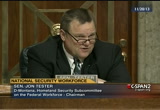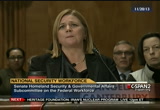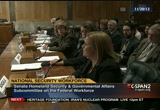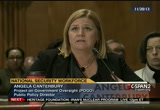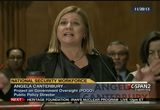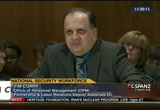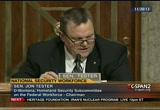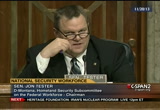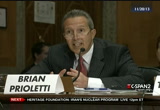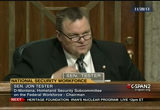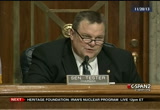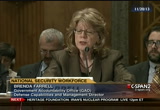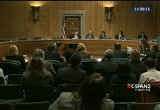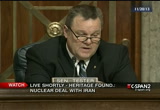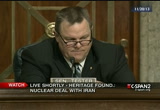tv Key Capitol Hill Hearings CSPAN November 26, 2013 10:00am-12:01pm EST
10:00 am
basic regulation using the existing tools. the application of aml, money transmitter laws that the exchange level, know your customer. those kinds of provisions. ..laws at the exchange level. know your customer, those kinds of provisions. the greatest challenge, the greatest area we have to grapple with is how do we enforce the enforcement techniques. and the fact that this is a global phenomenon. this is something that was just issued in march of this year. the guidance that directors just talk about, the financial action task force, their guidance on this issue was just issued this summer, i think in july.
10:01 am
my sense is that most of the world is not applying money laundering principles. getting from here to there is really the issue that the four of us would have to grapple with. >> thank y >> do you with see a lack of that can and how to go about reconciling that consensus? >> i'll take the second first. i don't know that i heard a lot of disagreement or anything we would generally disagree with from this panel or even really from the first panel. i was heartened by that. i think that ernie is correct that as we move forward, i think that an open dialogue is good so that as those disagreements do crop up x they likely will, we can address them quickly and in a safe and sane way. as to where we have agreement, i think what i heard from the other panelists is there's a real need to create onramps into
10:02 am
the traditional financial system, that by creating those onramps especially here in the u.s., you help to protect the system from abuse. the bigst obstacle to that happening today is not from regulation or from law enforcement, it's from the ability of businesses in the space to get bank accounts and to be integrated into the banking system. there is currently a chill in the banking system and in the banking industry that is preventing businesses from getting just simple, even simple checking accounts. there are stories that if you have the word bitcoin anywhere this your name or your documentations, you will immediately be -- your application will be immediately placed in the circular file, as it will. so i think there's a need to create some leadership within the banking industry to pick sure that these companies are onboarded into the traditional system where some of the
10:03 am
protections are in place already, and the illicit activity can be detected and rooted out. >> good, thank you. mr. allaire. >> like to echo some of the other panelists' comments. clearly, there's consensus around the innovation that we see the potential for financial inclusion. i think there's con census that many of the -- consensus that many of the regulatory tools are sufficient and being applied appropriately. i think there's consensus that the open nature of this technology, its development, its use and its oversight is a very positive framework. i do think that there is some tension around the question of the balance between anonymity and privacy and whether there are new laws that are required to end the possibility of anonymity on the internet or to address that in some way. i think, you know, as i stated in my comments, we are very focused within our business on
10:04 am
having very deep levels of identity verification, and so we view that as critical. but others within the digital currency world, particularly within geographies that don't have the same kinds of regulatory regimes may not. and there are other things that we need to be thinking about, other tools that we need to be thinking about for law enforcement that can address some of those issues. so i think that arena needs additional and careful consideration. >> all right, thank you. mr. brito? >> so i think there certainly is broad consensus among the panel up here, and i was very heartened to hear the first panel's message, and i'll pick two issues just to give you an answer. first, where is there agreement, i was interested in listening to the gentleman from the secret service who said that, in fact, it is centralized currencies that pose the greatest risk as far as money laundering and other illicit uses. and a decentralized currency like bitcoin, because of their nature, were not a greater risk.
10:05 am
i think that was of a great point of agreement there. to pick a point of disagreement, ms. shasky sort of took issue with the idea that u.s. businesses might move overseas seeking a better regulatory environment, and i think her suggestion was that if somebody leaves the u.s. seeking lax treatment, they're going to find eventually it's going to catch up with them. and i think the danger is not that somebody who's trying to facilitate an illicit business is going to leave the u.s. the danger is that real hard working entrepreneurs who are looking to comply just don't find a regulatory environment it is a amenable here. and that's something that we don't want to allow to stretch for too much time. >> okay, thank you. i want to go back to mr. allen. i think you mentioned the guidance issue, the issue by
10:06 am
fincen. and i'm not going to ask -- probably ask mr. allaire to lead off and respond to this question. but the issue with the guidance earlier this year, i think back in the spring, they stated that virtual currency exchanges and administrators would need to register as a money service business and apply for money transmitter licenses. in the 48 states that require such licenses. i want to ask you this, do you still focus on this for a little bit, and may i ask you, each of you and some of you already alluded to this guidance and giving it some thought, but i just want you to give me just, again, your thoughts on this guidance from fincen. do you believe it's a good fit for virtual currency exchanges or other virtual currency-related businesses? and mr. allaire, i'm told that your company as registered with
10:07 am
fincen and has applied for money transmitter licenses in a couple of states. and so you could maybe, if you would, just offer the first response. >> sure. you know, i think a business that is going to handle consumer funds, store and manage those and is going to interact with the banking system should be compliant with the rules that have been set forth through the bank secrecy act to protect consumers and insure that bad actors are not able to operate. so so i think in general we very much think these are appropriate guidelines, and i think the digital currency business is from a entrepreneurial perspective may be different than other prior internet businesses. you know, two guys can build a photo-sharing app and put it up on the web and get a billion users. i don't think it's appropriate that two guys should be able to build a financial services business and operate that without a sufficient investment
10:08 am
to protect consumers and protect society. and so i do believe that the bar needs to be higher for financial services businesses in the united states, and that it is not realistic which i think some in the entrepreneurial community would like to see regulation which doesn't require that level of compliance. i don't think that's realistic. when i founded the company and sought capital to build this company, we understand that the bar was higher, and we raised sufficient capital to launch in a compliant manner and hire the professionals and staff and put in place the systems and protections that were critical. so we think it's appropriate. there are challenges with how money transmission licenses are granted in the u.s. the broad number of states, the divergent approaches that each state might take, and i do think that creates cost and complexity and could be argued to be a unnecessary regulatory burden be, but that is the system that we have, and that is the system that we are pursuing and operating within.
10:09 am
>> good, thanks. others on same, same issue? mr. allen, do you want to chime in? >> yes, just briefly, senate carper. senator carper. i agree totally, and what i think is most appropriate about the guidance is it is focused at the exchange level. it does not apply to users, only to those -- it's an application of basic money transmitter law, and i think it is an appropriate use of the law, existing law, and i think it's a reasonable approach. i agree with him that one of the great challenges is creating consistency and uniformity because of our federal system and the fact that there could be 50 different approaches. but that's not unique to this issue. >> okay, thank you. any thoughts, please? >> yeah. the 50-state money transmitter license regime has come up. i do think that the states have a, an interest in protecting their consumers.
10:10 am
at the same time, it is a bit burdensome, and it has slowed down progress in the u.s. i don't know what the answer to that question is. i know in the e.u. they have a system of reciprocity where they have a minimum threshold for each country, and if you attain a license in one country, you can passport it to other countries as well. perhaps that's a framework that would work here, but that would be best left to the legislative branch. >> all right, thanks. mr. brito, any thoughts? >> one small point regarding the guidance, it's very clear as it applies to exchanges and to administrators of centralized virtual currencies. i think it's less clear when it applies to user, for example. if the guidance says you are not required to register with fincen if you are acquiring, say, bitcoin in order to buy goods or services. but let's say, for example, that my mother's from spain, and recently i helped her send money
10:11 am
back home. and it cost 5% of the total amount. what if i was buying bitcoin simply to remit money overseas as could be one of the great potential benefits to allow remittances to the third world and to other countries? that is not covered by the fincen guidance. so i think the guidance could use further explanation, and i think if fincen were to put any further clarification up to public comment, they would, i think, get all the wrinkles out. >> okay, thanks. let me go back to you if i could, mr. allen. i understand that your organization, international center for missing and exploited children, was one of the forerunners in bringing together private and public stakeholders to talk about virtual currencies. if you would, a couple questions. if you would, who was involved this your working group, and why did you form it? >> mr. chairman, we formed it because several years ago we had a very positive be experience in
10:12 am
bringing -- positive experience in wringing together financial -- bringing together financial industry leaders around the fact that the mainstream financial system, the mainstream payment system, credit cards, were being used for the purchase and distribution of child pornography. i called the chairman of a major credit card company and said how is this possible? and he said we don't know what these transactions are for. if you can find for us, show for us where the merchant bank is, where the account resides, this is an illegal use of the payment system. we can stop the payments, we can shut down the accounts. so we brought together coalitions in north america, europe and asia and had enormous positive be impact. positive impact. there was a dramatic decline. but as i began to talk to law enforcement what we determined was we didn't end it, we just moved it, and we were seeing evidence of a migration of these kinds of illegal operations into
10:13 am
this new economy. and so in an effort simply to try to understand it better and determine if it it wasn't a prom to use that same model to bring private sector leaders together to try the develop shared common sense solutions, that's why we joined with thomson reuters to to create this task force. and it includes the bitcoin foundation. it includes the tour project. it includes the gates foundation and the brookings institution. cato institute. vital voices, a human rights group. it includes multiple law enforcement groups and representatives. the intent was to bring people together, better understand the problem and search for common ground. and so that's been our process. >> let me just follow that up. and you've partly answered this question, but i want to ask it anyway. just share with us a bit further
10:14 am
what you've been able to learn from the dialogue that you facilitated, especially as it pertains to the exploitation of children around the world. >> i think we've really learned a lot in a short time. one of the challenges is most of the evidence is anecdotal. because relatively few cases are actually being made. as we've talked to law enforcement. i talked about that earlier in terms of the absence of investigative techniques to probe these kinds of things. but i think we have learned that there is broad-based interest in searching for and finding reasonable solutions that work. we have, we have learned, i think, as was pointed out earlier that the digital economy is far broader than bitcoin. so the issues we're focusing on are not just bitcoin, but, for example, there are 22 million users today of russia's web
10:15 am
money. we have talked about liberty reserve and the case that was made there, $6 billion in illegal money laundry. so i think we're discovering it's a complex issue, but i think it's one that is addressable, and i think the most encouraging thing to me is i now believe it's addressable using many of the tools and laws that we already have in place. that one of the biggest challenges for policymakers is simply to increase the level of awareness so that countries around the world will begin to use the tools they already have. awareness so that countries around the world will begin to use the tools they already have. >> well, that in part is the reason why we're having this hearing. good. i was talking with a fellow that goes to the same church as we do
10:16 am
in delaware. he's in the auto business. sells a lot of cars in our state. and he was talking about the work of the consumer finance protection bureau. established a couple years ago. hopefully to look out for the interest of consumers throughout this country in a lot of different ways. i want to focus just a little bit on consumers if we could. and the -- i've been told that virtual currencies pose a number of questions as to their use by consumers. and i have maybe two questions, but the first is, maybe we should go down the panel or up the panel. i'll start with you, and if you will, just give us some of your thoughts on whether virtual currencies have sufficient protections built in to them for consum consumers. the virtual currencies raise any additional new issues for
10:17 am
consumer protection? for example, do we need to do anything to better protect consumers from fraud or to protect consumer privacy as a result of these virtual currencies? >> so i think that we're still trying to find our way, as a result, that means the folks who are at this point participating in this economy really have to try hard to participate in it, so these are not your average consumers just yet jumping into the space. so at this point i think it gives regulators some time to learn more about the technology and learn more about what the industry players are doing to address these concerns and whether the existing concern protection laws are enough. as far as opportunities, what's interesting about especially decentralized digital
10:18 am
currencies, they provide a new choice for consumers. today if you want to use electronic payments you're going to use a credit card or pay pal, that am coulds with fees. sometimes high fees, and those fees are important, because they provide things like insurance. if you have a -- your identity stolen or something you received, it's not what you ordered. you can always have the charge reversed. decentralized currencies are like cash, there's nothing to reverse, it also means there are very little fees. this now presents a new choice for consumers. they can choose insured more expensive or less expensive. >> thank you. >> i think there's many issues around consumer adoption of digital currency. i'll touch on a couple of them. we emphasize that bit coin as a death tag currency offers great
10:19 am
potential to lower the fraud risk that both consumers and merchants face on a day to day basis when we conduct payments. when we go into a restaurant and give our credit card out or when we enter that information online, we're effectively giving out the keys our bank account. it should not be a surprise that we've seen a dramatic growth in the amount of identity theft, and specifically financial information, private financial information being stolen and sold on black markets and used for nefarious reasons. protocols like bit coin reduce that risk, because the keys to your bank account, the keys to your money are never transmitted, that's one of the brilliant aspects of the design of the system, there's real potential to lower the currency as a financial fraud and consumer transactions, and increase consumer privacy as a result. i think those are key benefits. but there are risks, clearly for consumers, one risk -- and this is one we take very seriously,
10:20 am
as we look at this, is increasingly because of ease of use, consumers that want to take advantage of things are using online services that essentially host their bit coin on servers orrin the internet. and because bit coin itself, the mechanism by which funds can be used is based on keys that we then inturn would store. there's a real risk around the security of fundses, we've seen occurrences in the past weeks of start-ups did not have security around those funds and funds were stolen. industry is driving forward on that, but i think that's a key issue that the cfpb may take a look at. i think there's other -- the flip side which is this question of what i will call merchant fraud, which is the charge back scenario, you didn't get the
10:21 am
product, you got the wrong product. someone had inappropriately used your account. i think that there are methods for addressing that within the technology of bit coin today. and within improvements that are coming in updated, upcoming versions of bit coin, mechanisms to create refunds to consumers, mechanisms to provide greater transparency around what you're paying for, and there are mechanisms that are not well understood, i think, generally, but which will become available where funds can be held in escrow until a product has been delivered to a consumer. there are ways to address some of that merchant fraud risk as well. i think you're going to see industry participate abts coming forward in the coming years. >> there are consumer protection issues. i'll reserve my comments strictly to bit coin and decentralized currencies. when you look at bit coin
10:22 am
especially, we haven't even released version 0.9 yet, so we're not on version 1.0, it's very much still an experimental currency, and it should be a high risk environment for consumers and investors at the moment. that's changing over time, as businesses like mr. olairs and others are coming into the space and building the service layers on top of the protocol, to make it safer for consumers to move in. those service layers are technological, bit coin is referred to as programmable money, you can build in layers of escrow and dispute mediation and things like that, right into your payment structure, which is a very interesting concept as most of the laws that exist for consumer protection and payment space were built around traditional methods where those aren't possible. you don't need as much regulation on the consumer side in the long term to the midterm as the system grows up.
10:23 am
in the short term, consumers should be aware this is a high risk environment, and it's not quite ready for mass adoption today. that time is it coming, but it's not here yet. >> thank you. >> mr. allen opinion. >> i don't think i have much to add, other than to say, one of the groups i met with are industry leaders. they view as the other panelists do, virtual currency akin to cash. there is no fdsc. there is not that level of protection. so i think it has to be viewed as high risk, and i think the points that the other pannists made about the fact that consumer protections are part of a work in progress, but certainly something we need to be aware of. >> the -- in anticipation, this hearing is asking our staff --
10:24 am
tell me a little bit, who was the creator, who are the creators? and i'm told that the protocol was developed by -- either by a programmer or by a group of programmers, that go by the name toshinakamato. is that correct? and with all the money and attention that's been given to bit coin, it seems strange to me that this -- either this individual or group would choose to remain anonymous. what do we know about this person? what do we know about this group. does it matter that his or her or their identity remains a mystery? who wants to go first? mr. murck. >> i'll field that one for everybody. so toshi nakamoto is the creator
10:25 am
for they who develop the bit coin protocol into the world in addition to the code base, that was open sourced to the entire community. this person or group of people has since left the scene, at least if not more than half of the code base from the original code has already been rewritten. while i think everybody is grateful for that incredible contribution at this moment in time, who sitoshi is is a story of bit coin going-forward. that was intentional and possibly why a pseudonym was chosen in the first place. >> i want to address, it is a little strange that bit coin, we don't know who the creator is,
10:26 am
and so that often conjures up the idea that there's a risk that we have not seen -- >> you don't think it was al gore, do you? >> you know, he's never denied it. >> but i think the key thing to emphasize is open source. open and audible and available for anybody to look at. mr. murck said, more than half of the code base has been written by others. i'm confident that it's -- the software is what it says. >> we're just about to start voting over in the capitol, so i think we'll wrap it up by -- i just want to say -- i'd love to
10:27 am
quote albert einstein. he said some memorable things, one of the things he says, in adversity lies opportunity. but inadversity lies opportunity. god knows there's plenty of adversity with respect to these virtual opportunities we talked about. it's not just potential, it's not just possible, it's real. we need to be not just mindful of that, but make sure we contain it and eliminate it where we can. i know one quote attributed to mrs. einstein. i find it relates to my -- mr. einstein was asked if she understands her husband's theory of relativity? she responded, i understand the words but not sentences. when i first started trying to
10:28 am
understand what this was all about, i sort of felt like mrs. einstein, i understand the words but not the sentences, with the help of our first panel and all of you on the second panel, and with the help of my staff and a lot of other folks, i'm starting to understand more than just the words, but a few of the sentences too. that's why we wanted to hold this hearing, to understand the pitfalls that come from this technolo technology. i said earlier, i thought the first panel gave us a lot of information. i thought they were thoughtful. it was encouraging and i find that that's been true here with
10:29 am
this panel as well. on behalf of my colleagues who are not here, who are flying in from all over the country right now, in order to make this 5:30 vote. thank you. they don't know i'm thank you, but i'll thank you in their absence. >> we have a shared responsible aeblts in trying to make this work. i'm going just to note that the hearing record will remain open for 15 days, that's until december 3rd at 5 p.m. for the submission of statements and questions for the record. i suspect we'll have a few be, may have a few from me. if you receive those questions, i would just ask that you respond to them promptly. again, to our staff, especially john collins who first brought this to me months and months ago, i want to thank our staffs, both majority and minority staff, and for you and for our
10:30 am
first panel for joining us today for the work that you've done in helping to enlighten us a bit on this subject. with that, we're adjourned, and thank you so much. >> and a reminder that you can watch this entire hearing anytime online at c-span.org. .. that's hosted by the center for strategic international studies here in washington, again
10:31 am
starting at noon eastern. switching over to our companion network c-span, former middle east adviser to present obama will take part in the present foreign policy challenges. you can see that from the new america foundation. at 3:15 p.m. on c-span coverage from california remarks by president obama. the next stop on his west coast fund-raising swing. dreamworks is run by top obama campaign contributor jeffrey katzenberg. the president is scheduled to speak at 3:15 p.m. eastern and again you can watch it live on c-span today. >> the '60s were different. [laughter] and there were a lot of things happening involving race, the breakdown in the structure in
10:32 am
society. i was suddenly out of the seminary and in new england. there were no rules. things were falling apart. without structure is very difficult to navigate. i was extremely fortunate. i was extremely fortunate to still have had a residual of the way i was raised, and the structure the nuns had given me, the structure the seminary to give me. i was also extremely fortunate because i had already been in saddam only black schools. i was the only black in my high school in savannah. so the transition to a school with very few blacks in a very difficult set of circumstances, academically and otherwise, i had sort of the jumpstart. i was ahead of the game, so i had something. so it allowed me to continue to do well, even though it was a
10:33 am
very difficult. >> thanksgiving a c-span here from two supreme court justices. clarence thomas at 9 p.m., followed by elena kagan at 9:45 p.m. eastern also this holiday weekend \40{l1}s{l0}\'40{l1}s{l0} a booktv on c-span2. on c-span3's american history tv, the 150th anniversary of the gettysburg address. >> last week a senate subcommittee examined how the government designates workers as sensitive and grants security clearance. this is 90 minutes.
10:35 am
>> we will call to order this hearing of the subcommittee on the efficiency and effectiveness of their programs and federal work force. this afternoon's hearing is entitled "safeguarding our nation's secrets," examined the national security workforce. i will say that senator portman is tight. he will be here a little bit late and he will have to leave early. unfortunately, it's not because of the importance of this issue. it is because we've got a defense authorization bill on the floor and that's giving a lot of folks who wanted to be here today away, but we will do our best to get as much good information as we can on the record as we proceed through this so that they will have the ability to make good decisions with good information as those decisions arise. from the significant disclosures of classified information to the tragedy of the washington naval yard, it is abundantly clear to the american people that the
10:36 am
federal government is failing to properly vet the individuals who were granted access to the agent nation's most secure facility. as we've all seen there are real-life consequences to these failures. and looking at the lessons learned, it's obvious there's no single quickfix to such a broken fixed -- system but it's about incomplete, falsified and multiply background investigations and reinvestigation. it's about agencies adjudicating which employees and contractors should be granted clearance and it's about pure volume. today there are nearly 5 million individuals with security clearance. you heard me right, 5 million. there are no indications that number will decrease anytime soon. it only takes one individual to slip through the cracks. one individual who can do untold damage to our national security by exposing sensitive information about government actions of program. one individual who, with no motive, with no warning could kill 12 men and women in the
10:37 am
security government facility on a random monday morning. we've got to get this right because there literally is no margin for error. face angle focus on the designation of position and the federal government as sensitive to national security, as well as requirement government personnel to access to classified information. lackey appropriate guidance for such designation federal agencies are colorblind on a patchwork executive orders, federal relations and the office of personnel management position the designation tool that was not greater to address security related issues. meanwhile, opm and the office of director of national intelligence are finalizing a rule they claim will provide the updated guidance sought by agencies and called for by gao and members of this committee. but others including some of the witnesses that are here today have real concerns that the proposed guidance is inadequate and that it could have negative and substantial implications on
10:38 am
taxpayers, national security, and federal employee rights. these concerns are compounded by -- this case involved to federal employees lost their jobs when their agency stripped them of their sensitization status. because the conyers decision denied these employees the rights to due process to the merit systems protection board, there's a real potential to tens of thousands of employers across the federal government have just lost a fundamental right to appeal a personnel decision, regardless of what drove that decision. with this in mind, senator portman, our ranking member, and i wrote a letter to odni and opm in september regarding their proposed role in that letter we said and i quote from a fiscal and security perspective, far too many questions remain unanswered about the implications of this proposal. and due to decisions of the concerns we share, we urge you to defer finalizing this rule and tell them that has been
10:39 am
fully and publicly aired. and questions about the true scope of the estimated cost a number of impacted federal workers are answered. we are here today to get some of those answers. i would now like to introduce our witnesses, and if senator portman has an opening statement, he can do that when he gets a. i wanted reduce my witnesses to the family today and we want to welcome them all. this truly is a great panel of witnesses. very knowledgeable and distinguished in your own way. first we have brian prioletti, assistant director of special security directorate at come in the office of the director of national intelligence. in that post is responsible for leading oversight and reform efforts of the security clearance process. mr. prioletti to the assistant director position as last may, after more than three decades in the cia. he testified before the full committee on security clearance
10:40 am
issues last month, and i want to thank you for your service, trying, and want to thank you for joining us again today. tim curry is a deputy associate director for partnership and labor relations in the office of personnel management. he's responsible for opm's efforts to design and promulgate governmentwide programs for labor and employee relations. prior to his current position, he served as executive director of the labor management and employees relations at the department of defense. tim, thank you for being here. and getting to the traffic to get it. brenda farrell is the director of defense capabilities at the management team of the government accounting office, a post she has held since 2007. choose possible for gao oversight, and military and civilian personnel issues and has worked extensively on the personal security class program. she testified before the subcommittee in june about the of clearly defined policy and procedures needed to consistently determine whether a
10:41 am
position cards a security clearance. it's good to have you back, brenda, and as with the previous two, we look forward to your testimony. david borer is the general counsel of the american federation of government employees, if ge represents some 650,000 federal employees including tens of thousands who currently occupied positions been sensitive to national security. he is a veteran on labor relations issues and is here today to discuss the impact of the proposed opm of odni rolled and its impact on federal employees. welcome. we look forward to what you have to say, david. finally, angela canterbury, angel is the director of public policy for the project and government oversight, or pogo, where she has worked in the capacity since 2010 period founded in 1981, pogo is a nonpartisan independent watchdog, that champions good government efforts. in particular, they have
10:42 am
aggressively advocated for more appropriate balance between national security and civil service rights. angeles work focuses on advancing policies that help stamp out corruption and promote government openness and accountability choose your today to help us understand how the opium odni rule might impact transparency and whistleblower rights. we welcome you angela and i want to thank you, everybody else are being here today. it is customary that we swear i'll witnesses in the pit before the subcommittee but if you don't mind, i would ask you to stand. raise your hand, right hand. [witnesses were sworn in] let the record reflect that the witnesses answered in the affirmative. with that, we will give each of
10:43 am
you five minutes for your oral testimony. know that you're anti-written testimony will be a part of the record. and we will start with you, brian, if you want to proceed. please do. >> thank you, senator. chairman tester, ranking member portman, and distinguished members of the subcommittee, thank you inviting here today to discuss our proposed update to the federal government position designation system. recently, the odni and opm to a proposed changes to the existing regulation outlining the position designation process. the revision which include more detail than previous regulations are geared to ensure that are consistent process is applied across the government to designate positions as sensitive or requiring a security clearance. this foundational step helps ensure that individuals are invest it at the level of -- appropriate risk inherent to the position they hold. thereby mitigating risk to national security interest. our proposed rule for the
10:44 am
designation of national security position was published in the federal register for a 30 day public comment in may 2013 with comments due in june. we are in the process of reviewing those comments and working to finalize proposed regulations by february 2014. the events of september 11, 2001, drove a dramatic increase the number of positions on a security clearance. a trend which has continued in recent years. office reported this year that about 4.9 million federal government have been determined to be eligible to hold security clearances. the potential risk to national security and costs associated with this volume of clued individuals underscores the need for executive branch agencies to have a uniform and consistent process to accurately designate the sensitivity of the position based on the position duty and potential impact the national
10:45 am
security, and ensure that individual holding these positions are properly investigated and adjudicated dementia without risk. the concern with position designation is not a recent phenomena. civilian positions within the federal government has been designated as sensitive based on their duties and responsibilities for over 60 years, when executive order 10 for fisa with most established, the requirement for federal employment process to consider national security interest. and charged the heads of federal departments and agencies to establish effective programs to ensure that employee hiring and retention is clearly consistent with the interests of national security. it requires a position to be designated as sensitive if the occupant of the position could diverge of the nature of position bring about a material adverse effect on national security. executive order which was issued
10:46 am
in 1995 establishes a uniform federal personnel security program for individuals who have access to classified information which only may be granted on the basis of a demonstrated for siebel needs for that access. 12968 also makes agency has responsible for establishing and maintaining an effective program to ensure the eligibility for access to classified information is clearly consistent for the interest of national security. the existing designation system requires revision to a line with other recently updated aspects of the clearance reform effort such as the revised federal investigators standard signed in december 2012, and to ensure a common understanding of federal agencies as to how to designate decisions and to ensure i could and consistent position designation across the u.s. government. the dni adds security agency and
10:47 am
the director of opm ads -- both have related roles to ensure that a uniform system for position designation related to each of their respective populations of the silly. the proposed regulation is not designated to increase or decrease the total number of national security sensitive positions within the federal government, but rather to ensure that each position is designated accurately. the intent is to issue national level policy guidance to promote consistency and designate positions, address change national security concerns polls 9/11. this approach will improve the consistency in the level of investigation performed for similar positions in other agencies, thereby promoting efficiency and facilitating reciprocity. additionally, they propose regulations aligned with the gao recommendations in its july report entitled security clearances, agencies need to
10:48 am
define policy for determining civilian position requirements. in that report the gao noted the need for standardized and clearly defined policy for agencies in designate positions as sensitive or requiring a security clearance and for existing position designation tools to be updated to include such guidance. the proposed regulations also incorporate the gao's recommendation that the executive branch agencies periodically review and validate or revised designations of existing positions. this guidance is expected to have positive implications for both national security and federal work force. they propose rule and revise position designation tool will provide executive branch agencies with consistent guidance and a concrete process to accurately reassess the sensitivity level assigned to the current position and ensure future positions are designated accurately and consistently.
10:49 am
the proposed rule will help guide agency heads and designating a position as sensitive with respect to national security, even if the position does not require access to classified information. the enhanced guidance will facilitate more uniform designations across agencies which are better aligned to the actual national security implications and sensitivities inherent with the position. this process is expected in some cases to result in the redesignation of positions to a lower sensitivity level or public trust designation. thereby reducing costs associated with investigations and agitations required for a higher clearance level. conversely, there may be instances in which a sensitivity designation of a position increases, therefore requiring more instance of -- extensive background information depending upon that we designated sensitivity level. if that happens the workforce can be assured that the change
10:50 am
is necessary, and based on the measured execution of the updated guidance deemed necessary to protect national security interests. the new regulations are intended to clarify the position designation requirement and provide additional details over the previous relation in order to ensure that positions are accurately designated in a manner that are properly mitigates the risk. federal workforce will benefit from accurately designated positions in that employers will not be required to complete extensive background application paperwork or undergo investigations for positions that do not warrant it. further, they consisted designation and investigative approach to most clearance reciprocity and, therefore, personnel mobility between positions of equivalence, position designation, or between agencies. it is imperative that we develop a sound position sensitivity designation process because the sensitivity level of a position
10:51 am
determines the complexity and cost of the investigation conducted on the individual selected to occupy the position. odni will continue to work with opm and other decadent branch agencies to ensure that position designation policy and procedures includes requirements for agencies to conduct periodic reviews to validate the accuracy of the existing position designation. thank you at this time for the opportunity to testify, and this concludes my statement. >> thank you, brian. tim, you're up next. >> mr. chairman, ranking member portman, and members of the subcommittee, thank you for the invitation to test the depth of the office of personnel management on regulations affecting the designation of positions in the federal government as manchester sensitive as well as a cab on versus -- the obligatio obligato doesn't majesty position is not a new authority. it is outline an executive order which was published in 1953. additionally, the code of federal regulations presently
10:52 am
requires each agency to follow established procedures to identify national security positions. in this vein, opm and office of director of national intelligence, odni, charlie propose regulations in may of this year regarding the designation of the national security positions in a competitive service. similar regulations have been in effect for over 20 years. they propose rule is one of a number of initiatives opm and odni have undertaken to symbolize and streamline the system of federal government investigated and adjudicative procesprocesses to make them moe efficient and equitable. opm originally proposed amendment on this issue in december 2010 with the publication to the federal register. this proposed amendment were later withdrawn and reissued in may 2013 by opm and odni jointly pursuant to presidential memorandum directing opm and odni to issue amended regulations. the presidential memorandum recognizes responsibilities both agencies possess with respect to
10:53 am
the relevant rulemaking authority. the current proposed rule similar issues the 20 proposal under joint authority with technical modifications and clarifications, and provides the public an opportunity to submit additional comments. the purpose of the proposed rule both as originally published and has republished is to clarify the requirements and procedures agency should observe and designating as national security positions in the competitive service, positions and excepted service with incumbent can be non-competitively converted to the competitive service and senior executive service positions filled by career opponent. they propose rule is not intended to increase or decrease the number of positions designated as national security sensitive it is intended to provide more specific guidance to agencies in order to enhance the efficiency, accuracy and consistency with which agencies make position designation. the older regulation provide only general guidance. the newer propose relations are intended to clarify the requirements and procedures
10:54 am
agency should follow when designating national security positions by providing more detail and concrete examples but in addition the newer propose regulations will agencies correctly determine the specific level of sensitivity for a position that is determined to affect national security which in turn will help determine the type of background investigation that would be required. finally the proposal addresses periodic re- investigations and to better coordinate the reinvestigation requirements for national security positions with requirements are already in place for security clinton. this will open sure that the same reinvestigation's can be used for multiple purposes and prevent costly to vocation efforts. they propose rule was published in the federal register on may 28, 2013 with the comment period that close 30 days later. we are presently reading comments from members of the public. this subcommittee also invited opm to testify on a separate topic, a kaplan versus conjures case. as you know, the u.s. court of appeals for the federal circuit
10:55 am
in a seven-three decision help the protection board lacked jurisdiction to review the merits of executive branch risk determinations regarding eligibility to national security sensitive positions. conyers examined whether the nspd in reviewing an appeal of an adverse personnel action against an employee may review the merits of the department of defense predictive judgment of national security risk. on appeal of the decision, the federal circuit concluded that the nspd can review whether duties action is perceived correct that cannot review whether it be correctly exercise its predictive judgment of national security risk. the federal circuit held that congress did not give mspb this authority. the federal circuit based its decision on long-standing precedent, specifically the supreme court's 1980 decision in department of the navy versus eagan that the mspb in reviewing an appeal of an adverse action cannot review the merits of an
10:56 am
agency decision to deny an employee security clinched the the federal circuit held that eagan and to all such national security determination, not just those related to access to classified information. thank you again for the opportunity to testify and other for to answering the question she may have. >> thank you, tim. brenda, you may proceed. >> chairman tester, and for the opportunity to be here today to discuss the requirements for personnel to have access to classified information. as you know my testimony on the governmentwide security clearance process before your subcommittee this past june included a discussion of our work on the steps that agencies use to first determine whether a federal civilian position requires access to classified information. today i'm here to elaborate on that process and report on the extent of progress by the agencies in implementing our recommendation and actions still needed. over the years gao has conducted a broad body of work on security clinched issues that gives us a
10:57 am
unique historical perspective. my remarks today are based by mr. litt on our july 2012 report on defining policy and guidance for national security positions. mining message today is that actions are still needed to help ensure that a sound requirement processes in place to determine whether a position pars a security clearance for access to classified information. my written statement is divided into parts. the first addres addresses guido determine if a sibling position requires a security clinched. in july 2012 we reported that the deny as security executive agent had not provided agencies could find policies and procedures to consistently determine if a position requires a college. absent such guidance agencies are using an opm go to determine the sensitivity and risk levels of positions which in turn inform the type of investigation needed. the sensitivity level is based on the potential of an occupant
10:58 am
of a position to bring about a material adverse effect on national security. opm audits, however, that inconsistencies among agencies using this tool to determine the proper sensitivity level. for example, and in april 2012 odd opm assess this is the level of 39 positions and its designations different from the agency in 26 of them. in our july 2012 report we recommended that the deny in coordination with opm issue are defined policy and procedures for federal agencies to follow when first determine if a position requires clearance. odni concurred and has moved forward with actions to address it. we kind of present authorize dni and opm to join address revisions to the federal regulation that are intended to provide guidance for the designation of national security positions. we believe that they propose regulation is a good step towards meeting the intent of our recommendation that however
10:59 am
implementation guidance still needs to be developed and the proposed regulation recognizes that point. the second part of my statement addresses the guidance in place to periodically reassessed to billion positions that require security clearance. we also reported in july 2012 at the dni had not establish such guidelines requiring agencies to review existing positions. without such a requirement agencies may be hiring or budgeting for initial and periodic personnel security clearance investigation using position descriptions and security clearance requirements that do not reflect current national security needs. further, since such reviews are not done consistently, agencies cannot have assurances that they're keeping the number of positions that require clearances to a minimum as required by executive order 12968 your moreover, conducting background investigations is costly. we found a federal government spent over $1 billion to conduct background investigations in
11:00 am
fiscal year 2011. we recommended in july 2012 that the dni in coordination with opm issue guidance to require agencies to be ugly reassess the designation of all federal civilian positions. odni and opm concurred with his recommendation to the propose regulations do not appear to require a periodic reassessment as we recommended. we believe this needs to be done. for more than a decade gao has emphasized the need to build and monitor quality throughout the personal security clinched process to promote oversight and positive outcomes such as maximizing the likelihood that individuals who are security risks will be scrutinized closely. the first step to assure that a sound process is in place to determine whether or not this agency access to classified information. we will continue to monitor the outcome of the final federal regulation as well as other agency actions to address our remaining recommendation to mr. chairman, this concludes my
11:01 am
remarks. i would be happy to take questions when you're ready. >> i appreciate your comments. david, you may proceed. >> mr. chairman, senator portman and members of the subcommittee, on the health of age and of the more than 50,000 federal employees we represented in tens of thousands who occupied positions as needed as sensitive, i think you for the opportunity to testify today. afge has great concerns about the recent decision issued by the u.s. court of appeals for the federal circuit in the propose rules on the designation of position as nash is security sensitive. issued jointly with opm and odni. the conscious decision and the propose regulations strike at the heart of the merit system. which for decades has been the foundation of the federal several service. congress to limit the rights to the meaningful hearing before the u.s. merit systems protection board. the propose regulation access with this bomb by allowing
11:02 am
agencies to pick and choose which employees will have the right to due process before the mspb. conyers in the propose regulations are only the latest injustices inflicted upon federal workers. thank you a three-year pay freeze, sequestration in which over half of the federal employees lost 30% of their take-home pay for six weeks, and a 16 day furlough with the shutdown, many were left unsure how or when it would be able to pay their bills. some untold numbers fell into debt or fail deeper into debt. that additional debt now potentially exposes thousands of federal employees to unfair removal from so-called sensitive positions without so much as a hearing before the mspb. to be clear, conyers does not pertain to individuals with security clinched. it is not a case about classified information. the individuals in that litigation and rhonda conyers, were in a county technician and a grocery store clerk.
11:03 am
both lost their eligibility because of a modest amount of delinquent debt due to circumstances beyond their control. they were penalized because of their credit scores, and worse, they had to pay for the loss of their jobs. this is deeply troubling to afge and it should be a real concern for this to me. the application of the financial hardship equates the disloyalty to the fourth place with no access to classified information is unsupported and offensive. in fact, afge has found that the practice of penalizing employees based on the credit scores has had a disproportionate impact on employees over 40 female employees, and employees of color. conyers is an ill-founded extension of an earlier case involving security clinched his. in 1980 the supreme court decided the department of navy versus eagan holding the mspb could not review the merits of a security clinched determination
11:04 am
in the course of adjudicating an adverse action to later in conyers, the mspb held that in the absence of a security clearance even did not apply. in its conyers decision the federal circuit old and the door to our burger and unchecked executive agency action. the conyers ruling rejected the structure and history of the civil service reform act along with the plain language of the egan to hold that the mspb not review the merits of an agency determination that unemployed is ineligible to hold a sensitive position. the proposed regulations are by no real oversight for agencies position designation determination. by contrast to the rule proposed by opm in 2010, these new rules fail to direct the agencies that in order to designate a national security position they must make an affirmative determination that the occupant of that
11:05 am
position could cause a material adverse effect on national security through neglect action or inaction. in both conyers -- if both conyers and the proposed regulations are allowed to stand, executive branch agencies will have the unreviewable power to deprive hundreds of thousands of employees the protection that congress gave him in the csr a. that, ma centers, is likely to be an irresistible invitation to abuse. the countup is loss of due process, eleanor holmes norton introduced h.r. 30-70 to clarify that workers are applicants are entitled to be heard by the mspb, even if it implicates a sensitive position determination. afge does look forward to working with the members of this committee to restore fairness and common sense to the due process protections and other rights that of historical
11:06 am
protected the federal workforce. this concludes my statement and i would be happy to respond to any questions spent thanks for statement, david. angela? >> chairman tester and ranking member portman, thank you very much for your oversight of the national security workforce and for inviting me to testify here today. i'm speaking on behalf of pogo but also map of the make is a coalition which represent more than 50 groups and millions of americans. very concerned with whistleblower protections in both the public and private sector. we are deeply concerned that the national security claims here and throughout the government really threaten to engulf our government and the cruel irony will make us less safe in august of this year this court decision in conyers strict federal employees and national security sensitive positions of the right to an appeal, an adverse action setting the stage also strip due process rights are actions that are discriminatory or in retaliation for whistleblowing. is deeply flawed decision armed agencies this week and how that affects untold numbers of civil
11:07 am
service. until because opm cannot say exactly how many position holders that are. the definition under the second quarter 10 for fisa for personal who may have had material adverse affect on national security must have objectives, credible downgrades to get in conyers the government did not provide adequate boundaries or justifications for national security sensitive designations but indeed rhonda conyers was an accounting technician and david was a common stock and any real credible national security role. law there is a need for additional screening for very limited numbers of supine position with specific national security responsibilities, but no access to classified information, extensive background checks should never be a prejudice 49 due process rights. quite the opposite. congress gave the civil service and whistleblower protections to the critical workforce to foster accountability or waste, fraud, and abuse.
11:08 am
these workers had for years been able to challenge adverse personnel actions at the merit systems protection board, but not anymore. now is an agency by dinesh history sensitive employee for having made a legally protected was a poor disclosure, or because of that employs rates or religion employee the employed t be able to seek justice. is just a matter of time as with those from the bench in oral arguments in conyers after the egan decision renewed due process right for security clearance actions but it was inevitable that the board would do the same or whistleblower retaliation as they did in the department of state. because conyers is so broad it clouds the congressional intent of the civil service reform act as was the blitzer -- was for protection act and the recent past and stronger bipartisan whistleblower protection enhancement act, reforms we worked for years to enact. of course, even before conyers there was a jaw-dropping lack of oversight of these seemingly
11:09 am
arbitrarily and overuse designations. at the direction of the president, opm and deny issued a joint proposed rule to clarify the proper use. we agreed it is about time but, unfortunately, it has nothing to assure us that the obama administration plans to curb a practically unlimited discretion afforded to agencies. improved efficient oversight or protect critical rights for whistleblowers and civil service. in fact, the proposed rule is poised to expand the use of these designations to overly broad categories position such as senior managers and undefined programs and fact-finding positions. before a final rule, far more needs to be known about the scope and cost, policy impacts, due process protections and oversight of these designations. we would welcome a directive from the president clarifying access to the mspb, and for opm
11:10 am
and odni to curb the expanded use of these destinations and conduct proper oversight. however, we believe that ultimately congress must reassert the right it previously provided to we urge you in advance using legislative fix, simply clarify that if an employee is feeling -- for a position that does not require security clearance may not be denied mspb review. this is the delicate holmes norton legislation that was mentioned. we also urge you to consider the broader context of the growing national security state. in the wake of the snow disclosures, we caution you to guard against overreaction. excessive secrecy undermines our democracy and friends our national security by making it harder for us to protect our legitimate secret. the evidence to the growing national security status is disturbing. as you mentioned, chairman, we have almost five men security clearance holders. approximately 20 million, four
11:11 am
drawer filing cabinets could be filled with the amount of classified data at committed every 18 months by just one intelligence agency, according to the gao but it's time for congress to be far less deferential to the executive branch on claims of national security. you can begin by reining in the nearly unbridled power of agencies to misuse national security labels and make whole swaths of our government hidden and unaccountable. we must be able to hear from whistleblowers. thank you again for inviting me to testify today and i look forward to your questions. >> thank you for your testimony, angela. and i think all of you for your testimony. we will get to the questions right now. some of this is going to be repetition from some of the panelists said, but this is for anybody who wants to answer it. in terms of the conyers decision, we're talking about two federal employees without a security clearance or any need
11:12 am
for classified information. one was an accounting technician. i assume that's similar to a cba may be or not even at that level -- >> lower level accounting. >> lower level accounting for the defense department. in that position for 20 years. one was a clerk in a commissary, which indicates to me probably ran a cash register, is that fairly accurate? >> he was a grocery store clerk, essentially. yeah, he ran a cash register -- >> and stock shelves. and because of the link with debt brought about by the divorce of one and a death in the family of another, they were stripped of their ability to hold a government position designated as sensitive to national security, designation is consistently arbitrarily and applied across government as angel just got done saying. they were subsequently stripped to the rights to appeal these personal decisions of the merit
11:13 am
service protection board and basic right of federal employees. there's so many questions to be asked about this but i'll just start with the basic one, and that is can somebody ask me how can someone explain to me how these actions were carried out in the best interest of our national security? >> he want to jump in on that one? no? okay. so let me ask you this. you've got the position that is designated as sensitive, and then you have a person in that position that does not have any level of security clearance. correct so far? and yet that person is fired because they've accrued some debt, debt beyond their control,
11:14 am
and that's been deemed okay? that's the first question. no? does anybody want to talk about that? t. want to go that's okay? >> senator, as you may know, afge has filed an appeal to the supreme court related to this issue, and i may be limited on what i do think about the case because the justice department represents the executive branch, but i guess the point i would make on this is, one, that an executive order trenton, you know, -- 10450, whether they have access to classified information or not. and the reason that opm went forward on challenging mspb's decision on this is the director of opm has authority under the law when it believes that mspb has rendered an erroneous decision, which is an erroneous
11:15 am
interpretation of civil service law, rule, or regulation. and so when the director sought reconsideration from mspb on this, the intent was to preserve the executive branch's authority to make risk determinations regarding national security positions. >> i got it. i mean, let me put on one end. i did get were if you have somebody who has a high security clearance, and they are somebody some money, but could possibly cover was what's going on. these guys didn't have a security clearance at all. they were working in sensitive positions but they did not have security clearance. it escapes me, it totally escapes me, and were going to get down, further down because you got to start here to get them into the real problems of this. it escapes me about a grocery store clerk could be put at the same level as somebody who's dealing with, in the department of defense with really sensitive information, or in the caa with
11:16 am
really sensitive information that does somebody some money. i honest to god don't -- first of all, i don't get how you can have a person working in a position that is deemed as sensitive and not have a security clearance. i don't get that at all. and secondly, if they don't have security glitch i don't understand why they can be fired for that reason and not have any appeal rights. fired because the base of the accrued debt. does this -- am i on a different level here? does this make sense to you guys? >> senator, i'm not in a position to determine what level you're on, but i can -- >> i'll take that as a consummate spin it was meant as a compliment. in this particular case, it's difficult to speak on behalf of dod. but as you mentioned, there are two points. one, in fact, they were in what was seen at the time sensitive positions.
11:17 am
>> but they didn't have personal clinch. they have not been vetted. >> there's a difference between a sensitive position and having any clearance as we know. the reason the position was considered sensitive is not based on whether want to access to classified information. it was good the position cause any type of adverse impact to national security. and in this particular case they get access, hypothetically, if have access to a food supply, you could, in fact, have an adverse effect to national security if that food supply in this particular case is a dod. >> do you think the folks down in the dirksen building buffett are sensitive positions? they have access to food. i.e., as you can tell, more regularly than i should there. [laughter] spent again, i would not comment on that last statement for sure.
11:18 am
the designations are done by the individual organizations and i would leave it to the appropriate organization to determine if -- >> so let's get back to where you're going. and that is, you are laying down and odni and opm are laying down in concert, laying down some regulations that agencies can follow, right? once those regulations are laid down will you be able to tell me whether the folks down in the survey will be designated in sensitive positions? >> once the regulation is enacted, but that regulation will do is provide you much clearer guidance so that we have uniform consistency across the determination factors, so that when you're making a determination on a particular position, the guidelines and the standards by which the position will be judged against will be consistent across the u.s. government. >> so regardless of whether you're working in the fda or
11:19 am
sba, there -- the same guidelines will apply, correct? >> well, sir, the cfr applies to the competitive service. but the idea is to apply that eventually across the u.s. government for consistency. >> just to get your point, once you get the regulations down a will apply across every federal agency equally, correct? >> yes, sir. >> okay. so who's going to make sure that the agency actually utilizes -- and i don't want to pick on you, brian, but you can answer to. was going to make sure the agency actually utilizes the rules? >> senator, you know, i echo brian's remarks. you know, the idea here is the current rules that apply to 732, they provide some very general guidelines where the proposed
11:20 am
rule is providing concrete examples more detail. so the goal here is to allow for more precision in making the sensitivity designation to the opm and odni both have oversight roles that they can assess how agencies are implementing these rules. we expect to also develop implementing guidance and also update the position designation tool which will also provide for more consistency across the government. and what we are trying to minimize is under designation of positions where it might impact national security and minimize over designation of positions which might increase cost. >> okay, but who is going -- where's the oversight of the agencies to use the rules that you're putting down? is it voluntary, or is somebody -- where's the oversight coming from? that's the question.
11:21 am
the question is you can put down the rules and if they decide not to use them, you don't have rules, you don't have consistency, you're not going to achieve the goals that i think we want to achieve. so the question is, who has oversight? >> oversight is a dual role in this case, both opm from a city built a site and from the odni from the security side. >> you're going to be, picking agency, department of justice, cia, dod, you're going to be providing oversight to see that they use those rules? >> yes, sir. that would be our responsibility. >> and so, how many sensitive positions do we have? out come back. senator portman. >> thank you, chairman. that will give them time to think about that question. verse, installing during the is is that you all know maybe our second hearing with help is also a of the full committee level on
11:22 am
this same issue. i think we all acknowledge there's a need for significant reform with regard to the security claims process. this is not our last hearing so we will continue to work on this. we appreciate you being here today and giving input. sorry i was late to this is kind of a crazy time right now with the budget conference going on insulin. but i'm pleased with made a little progress, even in the last couple of months. we have legislation that senator tester and i introduce that past called the score act, and it gives some important oversight responsibility on this, too. the expected general and opm, i think you're for me with, and we are actually working on additional legislation now that we think will also be able to move pretty quickly because it's bipartisan, and i think it makes the system more accountable and more efficient. on the defense authorization bill which is on the floor this week we've got an amendment that
11:23 am
asks gao to examine quality metrics and reciprocity as it pertains to the process. along those same lines we ask omb's performance accountability counsel to examine how we can improve the processes for access to state and local law enforcement records in the background investigation process. backing out of the tragic incident at the navy yard with aaron alexis. some of you may follow that. that came up in one of our hearings. that again, that access to state and local law enforcement records would've been helpful in the investigation, and the background investigation for him and it would be a way to shortcut some of these investigations. today, as we've heard we are focusing more broadly on the question of who should have access to information, how much information should be classified, how can we more efficiently and effectively again go through the clearance process. i have appreciated your testimony. i've had a chance to hear from some of you and look forward to some your other tests when. i'm going to focus in on
11:24 am
overclassification because i think that's one of the issues here. ultimately, when the going to be able to keep up with the clearance process if we continue to classify so much information. i think we need to get back to kind of the root of the problem and get it done i will ask more questions along the lines that chairman was asking. on overclassification or on classification, not to have a bias here, we have had in our committee hearings and in the full committee hearing this consistent income up that there's more information being classified. and it's a concern. one, because it is hard for people we represent, our constituents, to get access to information to understand how the government works and how it's conducting itself. and number two, if everything is classified, so that nothing is classified in my view any extent, if you think carefully about what you prioritize it's tough to protect information that really is a national security importance.
11:25 am
and i think not making that information available to the public might be one reason the national security sector sometimes is interested in classifying even when it might not have a national security implication. so this public interest the classification board, pic, which was established by congress back in 2000 has said a single intelligence agency classifies one petabyte of data every 18 months. that's the equivalent of 20 million filing cabinets filled with text, approximately 13 years of high definition video. so that's a single intelligence agency classifies that much every year and a half. i guess one shouldn't be the only indication metric we use the that certainty seems like a lot of information that frankly is very tough to keep up with. starting with this notion of how
11:26 am
much she would be keeping under lock and key, i would have a couple of question. by the way, the cost of this is growing, too. from 2001-2011, that 10 year period the causeway from $4.7 billion to $13.6 billion a year. sunup 13.6 -- 13.36 windows a year in cost associate with storing this vast amount of information. and by the way, that doesn't include the over $1 billion needed every just to clear the personnel authorized to have contact with this information or to work with this material. so maybe starting with odni, therefore, appreciate -- mr. prioletti, i appreciate you being here today because i think of the most expertise on the national security side to be up to talk about this. do you think we are overclassify
11:27 am
too much, too little? and talk to us about what goes into the decision-making process for information to be labeled as classified or sensitive. >> thank you, senator. i think what we do is classify what we feel is necessary at the time. i don't believe i'm in a position to say whether we overclassify or not. the volume that you mentioned is epic. but there are guidelines that are set specifically to determine what information needs to be classified, and that set of guidelines issued to determine what information goes under a classification or non-classification status. and i think we're using those as judiciously as possible. the pace of business and the emerging threats, environment we are working in, necessitates that we look at information on a daily basis and make that determination using the guidelines that i referred to.
11:28 am
>> and these new tools that we are talking about, the new regulation and so on is for determining whether somebody has a position that should be designated as sensitive, but you've also got tools that you're using to try determine whether something is classified or not. do you believe the kind of tools you have available to you are appropriate to make those decisions? >> yes, sir. i believe they are appropriate. but they are revolutionary in nature and change to meet the changing climate in which we work in. >> here's one of the other data points we have come this pid be which is charged with looking at how much classified information we have and what is going are o. they're the ones have indicated it's going so dramatically from $4.7 billion, to protect roughly 12 years ago to over $11 billion
11:29 am
today. but they said that it would take 2 million employees one year to review even one petabyte of information. and as i indicated, one petabyte of data is now being collected every 18 months by a single intelligence agency. so, 2 million employees one year to review it. obviously, we don't have the workforce to review that information, is that a concern? >> sir, if you mean is there a concern over the numbers you just listed, or the lack of personnel -- >> i think i'm it's not practical. i'm sure you guys would like a bigger budget but there's not going to be 2 million employees to review even this one had a bite we talked about. i guess, just give me a sense of whether odni is tackling this
11:30 am
11:31 am
organizations. the 13526 is looked out on a periodic basis to see is it valid and is there any need for change. that's how we continue the oversight in the organizations. >> as we take you off the hawks rico hotseat for a moment and go to brenda for an oversight perspective, more general perspective do you think is a problem of over ratification and do you think we are doing the right thing to declassify information so it's more useful? >> gal has noted the area that is in place for classified material but it's been several years. we just initiated work in this area and i would be more than happy to have the team explained the scope of the work to you or your staff if you would like. >> is there a research project on this classification? >> yes. >> that would be terrific if you could provide the committee that and the subject of a future
11:32 am
hearing. ms. canterbury, you mentioned as i recall you think the legislative branch or fights too much deference to the branch on classification. can you tell us why you think that and wipe it out to be done? >> i think it's on a range of issues classification is one of them. the national security claim has more and more context now and it sounds like the executive branch itself is not conducting proper oversight. thank you for this hearing as the previous hearings that you've had in this area because i think that it is long overdue. now all of the congressional attention in this space hopefully will spur some action and create some internal controls that are lacking. >> my time is over but i appreciate you being here today. this is just another hearing and attempt to get at this issue not
11:33 am
just overclassification but also the security clearance process and how to make it more efficient and effective to avoid the problems we saw today. thank you mr. chairman. >> thank you, senator portman. appreciate your work on this issue and i know that you are busy. appreciate you being here when you can. i'm going to go back to where i left off and that was we were talking about security clearances for people, both of those issues. how many -- and this is for anybody. how many sensitive positions have been designated? >> senator, it's difficult to estimate the number of positions across the government, but i would note that the number of
11:34 am
sensitive positions doesn't necessarily equally to the number of security clearances and because not only are there regulations dealing with competitive service employees, we also have accepted service in the government and of course security clearance applied to the employees as well as contractors. so it's difficult to estimate that right now. >> it is impossible probably to estimate, but under the proposed regulations, virtually anybody in the department, everybody in the department of defense could be designated as holding a sensitive position. we are talking about hundreds of thousands of employees who are being potentially be nitrites. let me illuminate something based on what you said earlier. the regulations are so insidious for two more reasons we haven't discussed today. one is conyers and worth over
11:35 am
were serving in the positions for years before the position was suddenly redesignated as a sensitive position. with the bat that redesignationy were suddenly scrutinized for their credit ratings and similarly brought before the agency and action was taken that was later deemed unreviewable so that's one thing, fine public servants with long service, no problem at all. it's invisible to the government with the credit looks like, who cares. suddenly with the stroke of a pen they are called into the process. secondly, because it is unreviewable, we haven't even been told it to this day what it was about mr. northover or ms. conyers position that merited this kind of treatment area to the government at some point in the case in the northover bumbled over the fact you might be able to tell how many sunglasses we order.
11:36 am
i fail to see as i'm sure the chairman and does how that is a security risk to the nation unless we are ruling out an amphibious assault on a city ofy of seattle where the sun never shined. >> go ahead. >> were conducted in 2011 and 2012 found that there was a lack of guidance to help determine the sensitivity. 732 was in place but it was very broad and in our work at the dod and the dhs, we had officials tell us that the definition was so broad that it could capture about any of the federal positions. so steps that had been taken to put some parameters around it is much needed. it's not tuesday by itself the federal deletion can answer the mail. >> you're talking about the one that was initially put on the books or are you talking about the one that was presented in
11:37 am
may of 2010? >> may 2010 which does repeat quite a bit of what was previously put on the books. the difference is some of the problems we discovered in 2011 and 2012 was that they hadn't taken an active involvement with opm and that was that they both received a designation of the odni and opm as a suitability agent in 2008. so there was a period where they had been determining how the role would interrelate. >> okay. so, i think that it was may of 2010, is that right or december of 2010? >> senator, the original regulation was proposed in december of 2010. and i would like to clarify a
11:38 am
point with regard to every position designated sensitive. as we noted in the explanation and the supplemental of the proposed rule december 2010, each position designation is going to be based on a review of each individual position based on their duties and the nature of their work and not a broad class of employees based on their mission. >> i'm not sure that he said. he said if you can take each position and designate it you could literally designate the whole position. >> let me get to 2010, which you said was not adequate, is that correct? >> it didn't have the involvement of odni and odni is the agent responsible for making sure that there is uniform policy and now with the current proposed legislation it does
11:39 am
acknowledge odni's role. >> so odni is involved now quick. >> yes. >> does that make the rule -- have you seen the rule if february 14 is when they are going to get put in stone have you seen that? been the current proposed legislation, yes. >> is that adequate? >> by itself, no and the rule does note that implementation guidelines are the responsibility with opm and that is what will be needed to make sure that there is the oversight that you're talking about and quality control in place are the agencies to implement. >> is it giving the agency the kind of tight ends they need to develop some uniformity, does it give them the metrics to both
11:40 am
determine which positions need to be designated sensitive, and i assume it deals with security clearances, to? >> it provides more detail. some of it is very similar in terms of the definition of national security positions, national security positions under the old rule. >> was the old rule adequate as far as that goes? >> apparently not, based on the work that we conducted in 2011 and 2012 because it was brought into the agencies had difficulty. >> so are we headed back to the same spot? the new rule is very similar to the old rule and the old rule isn't adequate. >> the new rule expands on the definition of national security positions. it includes some of the key positions that were named but then if tweaks it and expands -- >> still not adequate. >> i don't know -- >> studies done in 2010 and 2011 said that wasn't adequate.
11:41 am
>> we did our review that we issued last year we found that there was guidance, not adequate to help the agencies determine the suitability of the positions. that didn't include proposed changes because those were never implemented. >> mr. chairman, the new version of the rules published in 2010 will make key provisions that talk about what the agencies have to do in order to designate a position as a national security positions. about 2010 rule would have required an affirmative determination that the occupants could cause a material adverse effect on national security. that's been deleted. so there is no direction and certainly it will be easier for the agencies if they don't have to make that hurdle. and as you talk about oversight, for our money the oversight that's required is that review on the backend.
11:42 am
>> tim, do you want to talk about that? >> opm and a odni by these regulations and by our implementing guidance will provide details on uniformity consistence across the government, but under the executive order 1050 each agency has had responsibility to make the position designation. so what we are trying to do is assist them in exercising their authority by trying to ensure uniformity across the government. >> why would material adverse affect be taken out of the rule? >> that the requirement of executive rule this is implementing that order. >> getting back to the part about different agencies and you're right the head makes that call. are they bound by anything other than just the respect for you to utilize the rules that you put
11:43 am
forth? >> for purposes of consistency, yes, they would apply these rules but they alternately make the designation themselves. >> so, just to be clear and this isn't picking on anybody here, the agencies can determine whether to use or whether to go their own way when it comes to those designations? >> no sir. but they make the ultimate final decision when applying these rules. >> okay. >> senator, just for clarification when they are applying these they are in the best position to look at the positions in their agencies on the nature of those duties of the position into determining the adverse impact on the national security if there is action, inaction or neglected
11:44 am
duty by the person in that job. >> mr. chairman o and the just o there is no misconception on the part of the committee about the consistency and the integrity of this process, i would point out that in ms. conyers case, the agency reversed itself and cited expressly the pending litigation as a reason why you they were going to drop the redesignation of the position and administer northover's case he was later restored to this position as a result of an unrelated claim and has since been promoted so we can talk about consistency and applying rules and so forth. the reality is on the ground level in the agencies it doesn't happen and the managers are manipulating the process. >> what i want to get to if i want to make sure, and i think that angela brought this up in her opening statement cost oversight, due process, all
11:45 am
those things need to be handled. i am an open government kind of guy. the better it is the more it works. and i understand that there are people who want to do harm to this country so we have to make sure the folks that really do have access to sensitive information are properly vetted. why we don't know how many sensitive positions are classified within government is disturbing to me. maybe i shouldn't feel that way, but i do. i think that if we have agencies out there that are arbitrarily, and i know that was part of the goal was to get rid of the arbitrary designation of the nation but if we can only do that and the person that knows that without a doubt are you guys, probably everybody at the table as a matter of fact, they
11:46 am
can arbitrarily do what they want as far as determining which positions are sensitive because they can find something out there that would do that. the example of food was a fine example because we all eat. why -- i guess the question is are we going to end up with another snowden incident or naval yard shooter incident because we have so many of these things to do that folks end up cutting corners in the process. and i don't mean to verbalize too much about this on angela brought this up, the fact is that we have got a situation where we have got so many people out here with security clearances that corners are being cut to get those clearances done in a person could deny that but the proof is
11:47 am
in the pudding and look what happened, look what happened with alexis. so oversight by the legislative branch is something that i think we ought to take back a lot of the power that we have to make the three equal branches of government. and hearings like this help. any other suggestions that you might have, angela, as far as what we can do here to make sure that the rules at odni and opm actually do what i think you guys want them to do. and yet doesn't break the bank and protects due process of the workers and you know, go ahead. >> thanks very much a mature man. first and most importantly, congress is going to have to fix the law and make sure that the civil servants and whistleblowers have access.
11:48 am
that is an absolute first must. second, the positions need to be better understood and categorized before a proposed rule, before a finalized rule. it should have been done before the proposed rule in our estimation. i might suggest a process similar to that with the analysis information. we had all of these strange secret markings have proliferated and the agencies were just marking things for official use only, unclassified, so the obama administration put together a process to try to rein that in and have some rationale for information that isn't classified but is controlled but unclassified. and so, in inventory took place. i might recommend something along those lines in these positions if we really want to get a handle on the legitimate designation than tell us what
11:49 am
those are. i'm a little confused like you. if there is not a security clearance, then what are the legitimate designations for national security. tell us agencies and then base april based upon that. >> tell us what the metrics are for determining the position click. >> yes, absolutely. and what positions you are using now and have a very good thorough look at whether or not those can be streamlined into very narrow, very specific concrete categories so that the agencies don't have legal room. then you need to have oversight over this process. opm has not been doing its job. they were given responsibility by president eisenhower, an executive order 10540, and they were supposed to be overseeing how the agencies designate this. i mean, what we heard today if they are letting them do whatever he and after this rule they will also be completely deferential to the heads of
11:50 am
these agencies. they have no plans to go back and check whether or not the rule will be applied properly. >> i will let you respond to that. >> as i noted earlier, opm and odni have an oversight role with regards to these rules and there will be oversight and assessment of how the agencies were applying these rules so i would respectfully disagree with that. >> excuse me for not knowing this answer but are there metrics in the new rule click. >> i'm consulting. there are reporting requirements so based on the reporting requirements we can learn information on how they are implementing this but there is no specific metric. >> so, there's not metrics in the rule do you have the metrics to know that they are implementing the rule in a way
11:51 am
that it is intended? what we are proposing in the rule is to comply with the process efficiency requirements, additional data may be collected conducting investigations are taking action under this part. these collections will be identified in separate guidance issued as necessary under 732103, which is our current regulations that deal with national security positions. so, there is an opportunity for us that we would collect additional data. >> okay. so, do you feel confident that what you've done with the rule and your ability to collect additional data and that you have the manpower to be able to ensure that the clearances are given to those who only absolutely need them? >> i would note it is unrelated to the security clearances. it's only related to position sensitivity designation.
11:52 am
>> apply it to the designation of the other positions. >> in addition to the rules and the implementing guidance into the position designation pool, those are the tools that are going to help the agencies in making those designations being consistent. there will be training that is offered by the federal investigative services and that training will be updated for the agencies to begin assist agencies and they are making those determinations. >> said, putting that in montana talk to you have the ability than to make sure that the positions that are classified are positions that are necessarily needing to be classified? >> sir, i can't answer that question right now. i think as we are developing implementing guidance -- >> is that a goal in the
11:53 am
department -- >> certainly as part of our oversight responsibilities, we want to ensure that the proper designations are being made. >> okay. do you want to speak about the security clearance angle, same group of questions as far as making sure the folks that absolutely need them and get them into the folks that don't don't. >> i agree with what mr. curry mentioned. the 140of the 1400 that we were originally talking about here was in fact a position designation tool, not a security clearance to. and if i may speak to what angela mentioned earlier, asking for more detail, that's exactly what the proposed rule would do. it would provide more detail to the organizations in terms of guidance and how to determine those designations of the position. and we belief that this rule will get us a lot further than we were in the past. this isn't new as we mentioned in the testimony of all of us
11:54 am
mentioned designations of position have been going on since 1953. and it is an evolutionary process, and i think that we continue to build and make a better product to address those issues. >> i want to talk about security clearances for people to. we have 5 million of them. 1.5 for top-secret. is there anything being done in depth to make sure the people who need them have them into the folks that don't don't have them? >> 5 million seems like a lot of folks to have a security clearance and 1.4 million top-secret security clearance seems like a pile. that's more than live in a state of montana by about 40%. can you give me an idea on if there is any metrics or any advice or guidance that's being given to agencies on that? >> we have existing guidance under 12968 and 12367.
11:55 am
>> how old are those rules? >> 12968 was amended in 95 and 134617 out in 2008 so they are not quite as old as -- those are the guidelines given to all organizations to determine the classification and clearance granting for individuals. it includes the educated guidelines in your investigative guidelines and those are what are used by all organizations to make a determination if the security clearance is required for an individual or not. >> in your opinion is that adequate? are we making sure security clearances are going to those who absolutely need that access to that information to be able to do their jobs? >> yes sir i believe they are because they are continually reviewed and revisited to determine to ensure that they
11:56 am
are meeting today's environment in which we work. >> okay. brenda, i want to get back to the rules and codification of them. do you think that there is a worth in codifying the guidance, the updated guidance along with quality control periodic reviews guidance beyond the 24 month proposed rule clicks do you think that the codification is a good thing in this case or do you think it isn't necessary? >> what we see missing is the periodic assessments area there will be a one-time assessment that the agencies will be required to conduct within two years after the rule is finalized so that is still a missing piece. we still don't know what the implementation guidelines are, which i agree should be developed after the rule, but the implementation guidelines will be critical in order to
11:57 am
understand what the oversight will be and what the quality controls will be. the proposed rule is in and prevent over the current rule. the current rule again is so broad it is subject to interpretation across-the-board. the proposed rule does provide more information to the agencies, but again, by itself and without proper oversight it still is unknown whether this will increase the number of clearances, decrease the number of clearances or whether there will be some other issues as some of the panel members have raised. >> well, i think we will wrap this up. i want to thank everybody for being a part of the hearing. look, i will just say this,
11:58 am
hopefully we have the same goals and i think angela for her opening statement that don't have cost and due process and oversight and all that stuff, overclassification. if those are not the goals, then somebody has to tell me what the goals or because those ought to be the goals. i think the only way we are going to get to a position where this doesn't break the bank and we can do a good job classifying the positions that need to be classified is if we laser in and give the agency directive to make sure that they are following the directives. i'm not sure that that is going to happen. but i can tell you that if it does not happen, these kind of sessions are not going to stop. they are going to continue.
11:59 am
these committee hearings and asking folks to be accountable for what's going on are going to continue. so, i would just say that if there are ideas either from the private sector, non- profit sector from the union groups, from the agencies that we can help you with to be able to help you do your job to make sure that we are able to achieve what we are trying to get here with truly having positions that are designated sensitive that need to be designated sensitive and not because it is convenient to designate them as sensitive or some other reason were the same thing with security clearances, making sure that the folks that have them made them and that they are not just in and out like candy at halloween. i think it is going to be important. and so i will offer as the chairman of the committee and i know senator portman will do his best, too to make sure that we
12:00 pm
fix what i think is a serious problem that i talked about in my opening remarks, and i would just say that this will only get fixed if -- you hear this i and the legislative branch if we work together and i mean between the branches and with the private sector. so i just want to thank you all for being here this afternoon. i'm going to be introducing legislation on the clarence accountability reform act along with drinking member portman, mccaskill, johnson and others to bring more accountability to the security clearance process. hopefully that will help you do your job you do that is a key part of the legislation that will require updated guidance along with quality controls from you folks, opm and the odni. we require periodic reviews of guidance to make sure there's regulated updates with the requirements. i would say that -- i would argue in fact there is a lack
103 Views
IN COLLECTIONS
CSPAN2 Television Archive
Television Archive  Television Archive News Search Service
Television Archive News Search Service 
Uploaded by TV Archive on

 Live Music Archive
Live Music Archive Librivox Free Audio
Librivox Free Audio Metropolitan Museum
Metropolitan Museum Cleveland Museum of Art
Cleveland Museum of Art Internet Arcade
Internet Arcade Console Living Room
Console Living Room Books to Borrow
Books to Borrow Open Library
Open Library TV News
TV News Understanding 9/11
Understanding 9/11